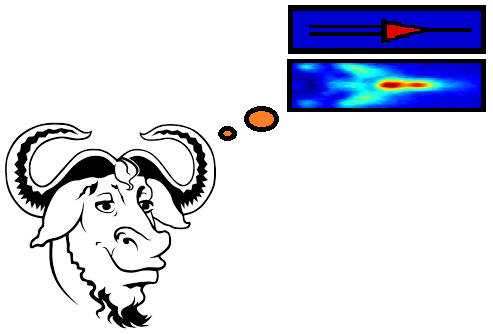| GNU Gneural Network - Do We Need Another Open Source DNN? |
| Written by Mike James | |||
| Tuesday, 12 April 2016 | |||
|
Everyone who is anyone needs their own neural network package and GNU, not to be left out of the action, has just released version 0.8.0 of Gneural - what else would they call it? Is this just a gesture to freedom? Has the horse already left the stable?
Mostly I think that the Free Software Foundation does good things. I can't say that I always agree with its standpoint, and sometimes thing go a bit too far, but overall it is in the right direction. Now we have the GNU Gneural Network, which is to strike a blow for the freedom of AI everywhere. No, not robot rights, but I'm sure the FSF will get round to that, they may already have. The idea behind Gneural is that the actual techniques of AI should be available to all, well all that take the time to learn and understand the ideas involved. As the mission statement says: Nowadays, companies such as Google and IBM are doing a great service to all of us by showing what can be achieved by using Artificial Intelligence (AI). For instance, the results achieved by AlphaGo and Watson are outstanding and truly inspiring (the least one can say). But the fact that only companies and labs have access to this technology can represent a threat. First of all, we cannot know how money driven companies are going to use this novel technology. Second, this monopoly slows down technology adoption. As a matter of fact, data and trained neural networks are rarely shared, and one should always remember that in practice without the training data it is almost impossible to duplicate results (even when the source code is available). The bottom line is: We should ask ourselves: Do we really want that only a few can use AI? Should not Progress and Knowledge be for everyone instead? You can't argue with that, but you can ask why AI should be singled out for special treatment when so much progress and knowledge is locked up in one way or another. The conclusion is: "In spite of the plenty of AI codes available and released under some permissive license, it is time for a Free AI which gives complete freedom to the users and the community. Hopefully, this could reduce the duplication of efforts one observes today." The initial part of the statement is true - there are plenty of AI frameworks, toolkits and libraries out there already. This suggests there really isn't much need for another one. Gneural boasts that the current version, 0.8.0, has the following features:
All this is very well, but what about the data and the training? Big companies like Google train their networks on huge datasets, which aren't available to the likes of us. In fact, one of the main tasks for any AI researcher is to locate a suitable corpus of data to use to train the network. The second main task is to then find enough computing power to do the actual training. Gneural doesn't do anything for these two principle separators of the AI "haves" and "have-nots". Gneural also doesn't do a thing for the fact that Google and others already have patent applications on the very basic processes of AI as applied to neural networks - including Q Learning with deep networks and the very act of classification, see Google Files AI Patents. It could well be that Gneural already infringes enough AI patents to get it shut down. This is the real problem that FSF should be tackling, not replicating software that already exists. A better program to free AI might be to organize work on large reference datasets that could be used to train networks, organize free access to hardware for large scale network training, and to find prior art to invalidate specific AI patents. Dream on happy gnu.
More InformationRelated ArticlesWhite House Advises That APIs ARE Copyrightable Fujifilm Has A Patent On Converting To Greyscale A Neural Network Chatbot - Surprisingly Human? OpenCV 3.0 Released - Computer Vision For The Rest Of Us Inceptionism: How Neural Networks See
To be informed about new articles on I Programmer, sign up for our weekly newsletter, subscribe to the RSS feed and follow us on, Twitter, Facebook, Google+ or Linkedin.
Comments
or email your comment to: comments@i-programmer.info
|
|||
| Last Updated ( Tuesday, 12 April 2016 ) |


